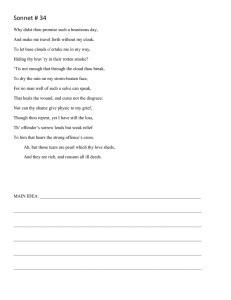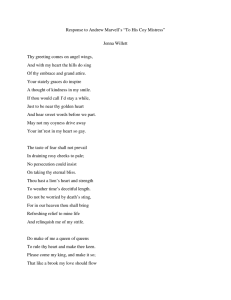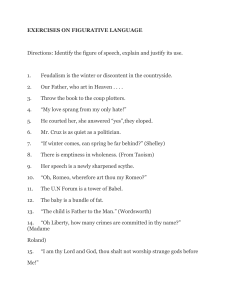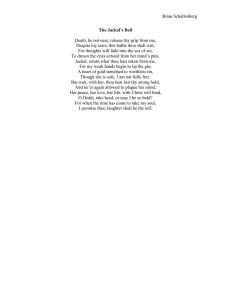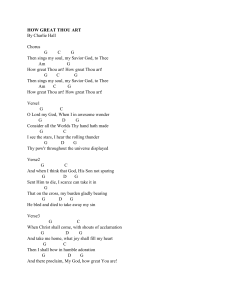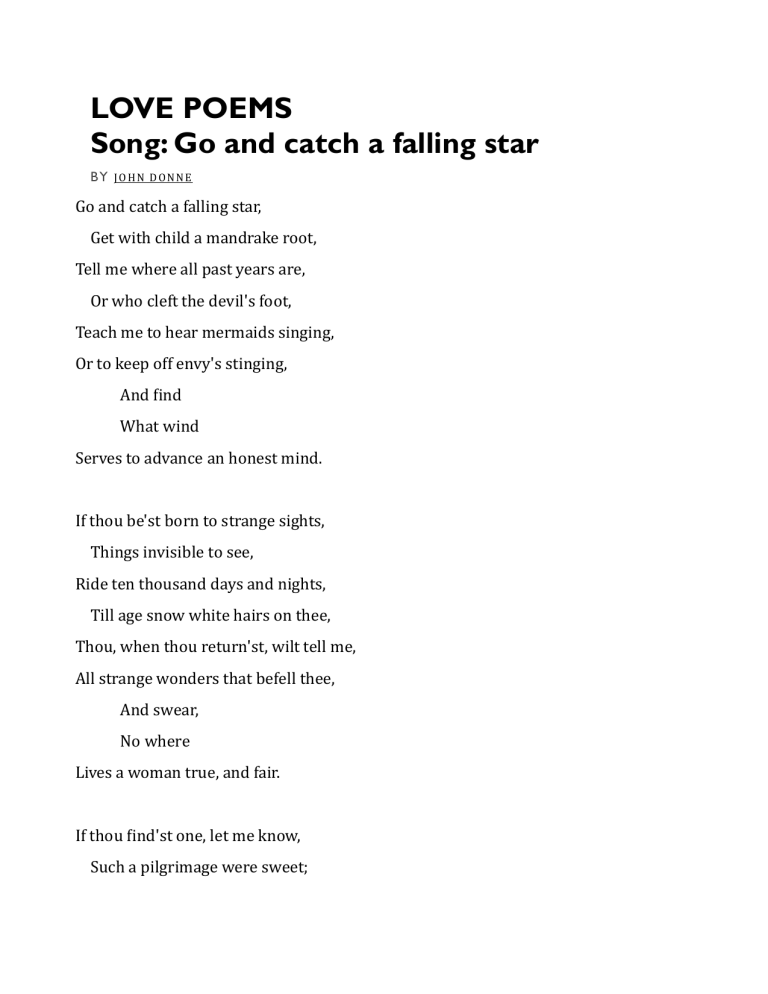
LOVE POEMS Song: Go and catch a falling star BY J O H N D O N N E Go and catch a falling star, Get with child a mandrake root, Tell me where all past years are, Or who cleft the devil's foot, Teach me to hear mermaids singing, Or to keep off envy's stinging, And find What wind Serves to advance an honest mind. If thou be'st born to strange sights, Things invisible to see, Ride ten thousand days and nights, Till age snow white hairs on thee, Thou, when thou return'st, wilt tell me, All strange wonders that befell thee, And swear, No where Lives a woman true, and fair. If thou find'st one, let me know, Such a pilgrimage were sweet; Yet do not, I would not go, Though at next door we might meet; Though she were true, when you met her, And last, till you write your letter, Yet she Will be False, ere I come, to two, or three. The Sun Rising Launch Audio in a New Window BY J O H N D O N N E Busy old fool, unruly sun, Why dost thou thus, Through windows, and through curtains call on us? Must to thy motions lovers' seasons run? Saucy pedantic wretch, go chide Late school boys and sour prentices, Go tell court huntsmen that the king will ride, Call country ants to harvest offices, Love, all alike, no season knows nor clime, Nor hours, days, months, which are the rags of time. Thy beams, so reverend and strong Why shouldst thou think? I could eclipse and cloud them with a wink, But that I would not lose her sight so long; If her eyes have not blinded thine, Look, and tomorrow late, tell me, Whether both th' Indias of spice and mine Be where thou leftst them, or lie here with me. Ask for those kings whom thou saw'st yesterday, And thou shalt hear, All here in one bed lay. She's all states, and all princes, I, Nothing else is. Princes do but play us; compared to this, All honor's mimic, all wealth alchemy. Thou, sun, art half as happy as we, In that the world's contracted thus. Thine age asks ease, and since thy duties be To warm the world, that's done in warming us. Shine here to us, and thou art everywhere; This bed thy center is, these walls, thy sphere. Air and Angels BY J O H N D O N N E Twice or thrice had I lov'd thee, Before I knew thy face or name; So in a voice, so in a shapeless flame Angels affect us oft, and worshipp'd be; Still when, to where thou wert, I came, Some lovely glorious nothing I did see. But since my soul, whose child love is, Takes limbs of flesh, and else could nothing do, More subtle than the parent is Love must not be, but take a body too; And therefore what thou wert, and who, I bid Love ask, and now That it assume thy body, I allow, And fix itself in thy lip, eye, and brow. Whilst thus to ballast love I thought, And so more steadily to have gone, With wares which would sink admiration, I saw I had love's pinnace overfraught; Ev'ry thy hair for love to work upon Is much too much, some fitter must be sought; For, nor in nothing, nor in things Extreme, and scatt'ring bright, can love inhere; Then, as an angel, face, and wings Of air, not pure as it, yet pure, doth wear, So thy love may be my love's sphere; Just such disparity As is 'twixt air and angels' purity, 'Twixt women's love, and men's, will ever be. The Good-Morrow BY J O H N D O N N E I wonder, by my troth, what thou and I Did, till we loved? Were we not weaned till then? But sucked on country pleasures, childishly? Or snorted we in the Seven Sleepers’ den? ’Twas so; but this, all pleasures fancies be. If ever any beauty I did see, Which I desired, and got, ’twas but a dream of thee. And now good-morrow to our waking souls, Which watch not one another out of fear; For love, all love of other sights controls, And makes one little room an everywhere. Let sea-discoverers to new worlds have gone, Let maps to other, worlds on worlds have shown, Let us possess one world, each hath one, and is one. My face in thine eye, thine in mine appears, And true plain hearts do in the faces rest; Where can we find two better hemispheres, Without sharp north, without declining west? Whatever dies, was not mixed equally; If our two loves be one, or, thou and I Love so alike, that none do slacken, none can die. A Valediction: Forbidding Mourning Launch Audio in a New Window BY J O H N D O N N E As virtuous men pass mildly away, And whisper to their souls to go, Whilst some of their sad friends do say The breath goes now, and some say, No: So let us melt, and make no noise, No tear-floods, nor sigh-tempests move; 'Twere profanation of our joys To tell the laity our love. Moving of th' earth brings harms and fears, Men reckon what it did, and meant; But trepidation of the spheres, Though greater far, is innocent. Dull sublunary lovers' love (Whose soul is sense) cannot admit Absence, because it doth remove Those things which elemented it. But we by a love so much refined, That our selves know not what it is, Inter-assured of the mind, Care less, eyes, lips, and hands to miss. Our two souls therefore, which are one, Though I must go, endure not yet A breach, but an expansion, Like gold to airy thinness beat. If they be two, they are two so As stiff twin compasses are two; Thy soul, the fixed foot, makes no show To move, but doth, if the other do. And though it in the center sit, Yet when the other far doth roam, It leans and hearkens after it, And grows erect, as that comes home. Such wilt thou be to me, who must, Like th' other foot, obliquely run; Thy firmness makes my circle just, And makes me end where I begun. Holy Sonnets: Thou hast made me, and shall thy work decay? BY J O H N D O N N E Thou hast made me, and shall thy work decay? Repair me now, for now mine end doth haste, I run to death, and death meets me as fast, And all my pleasures are like yesterday; I dare not move my dim eyes any way, Despair behind, and death before doth cast Such terror, and my feebled flesh doth waste By sin in it, which it towards hell doth weigh. Only thou art above, and when towards thee By thy leave I can look, I rise again; But our old subtle foe so tempteth me, That not one hour I can myself sustain; Thy grace may wing me to prevent his art, And thou like adamant draw mine iron heart. Holy Sonnets: Death, be not proud BY J O H N D O N N E Death, be not proud, though some have called thee Mighty and dreadful, for thou art not so; For those whom thou think'st thou dost overthrow Die not, poor Death, nor yet canst thou kill me. From rest and sleep, which but thy pictures be, Much pleasure; then from thee much more must flow, And soonest our best men with thee do go, Rest of their bones, and soul's delivery. Thou art slave to fate, chance, kings, and desperate men, And dost with poison, war, and sickness dwell, And poppy or charms can make us sleep as well And better than thy stroke; why swell'st thou then? One short sleep past, we wake eternally And death shall be no more; Death, thou shalt die.
